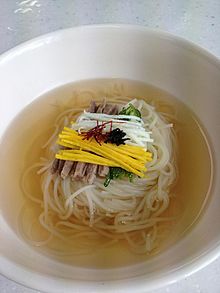Janchi-guksu (Korean: 잔치국수) [2] or banquet noodles[2] is a Korean noodle dish consisting of wheat flour noodles in a light broth made from anchovy and sometimes also dasima (kelp). Beef broth may be substituted for the anchovy broth. It is served with a sauce made from sesame oil, ganjang and small amounts of chili pepper powder and scallions. Thinly sliced jidan (지단, fried egg), gim (laver) and zucchini are added on top of the dish as garnishes.[3] Janchi-guksu have various garnishs with noodles. The word “Janchi” means “feast” in korean. The name came from where someone can taste it on a feast day such as marriage or hoegabyeon. [1]
注:dasima=昆布 feast=ごちそう

History
The name derives from the Korean word janchi (잔치, literally “feast” or “banquet”), because the noodle dish has been eaten for special occasions like wedding feasts, birthday parties, or hwangap (60th birthday celebration) throughout Korea. The word guksu means “noodles” in Korean, and noodles symbolise longevity - in life, in a marriage.[4]
There are records of guksu dating back to the Goryeo period. In the book Dongguk Isangguk Jeonjip Book 6 (hangul:동국이상국전집 6, hanja:東國李相國全集) there is a mention of guksu in a line of poetry, and in the book Goryeo Dogyeong (hangul:고려도경, hanja:高麗圖經) written by an envoy from the Chinese Song Dynasty it is mentioned that guksu was eaten on special occasions as wheat was rare and expensive in Goryeo.[5] (The most common ingredients for noodles were buckwheat or starch.)[5]
東國李相國集(東國李相國集)卷第六古律詩
憶二兒 二首
我有一弱女。已識呼爺孃。牽衣戱我膝。得鏡學母粧。別來今幾月。忽若在我傍。我本放浪士。落魄寓他鄕。沈醉數十日。病臥三旬强。廻首望京闕。山川欝蒼茫。今朝忽憶汝。流淚濕我裳。僕夫速秣馬。歸意日轉忙。
我有一愛子。其名曰三百。予和吳郞中三百韻詩。是日兒生。因以爲名。 將興指李宗。來入驚姜夕。爾生骨角奇。眼爛面復晢。磊落三學士。作爾湯餠客。兒生七日。吳郞中世文,鄭員外文甲,兪東閣瑞廷來訪。作詩相賀。 綴詩賀弄璋。詞韻鏘金石。願汝類其人。才名轥元白。我生少展眉。得汝長笑謔。往往向人誇。始得譽兒癖。仲夏五月天。初別長安陌。遷延客萬里。忽見霜葉赤。時節日遷代。我病日云劇。無由撫犀顱。惻惻傷胸膈。
http://db.mkstudy.com/zh-tw/mksdb/e/korean-literary-collection/book/reader/8200/?sideTab=toc&contentTab=text&articleId=895479

0 件のコメント:
コメントを投稿